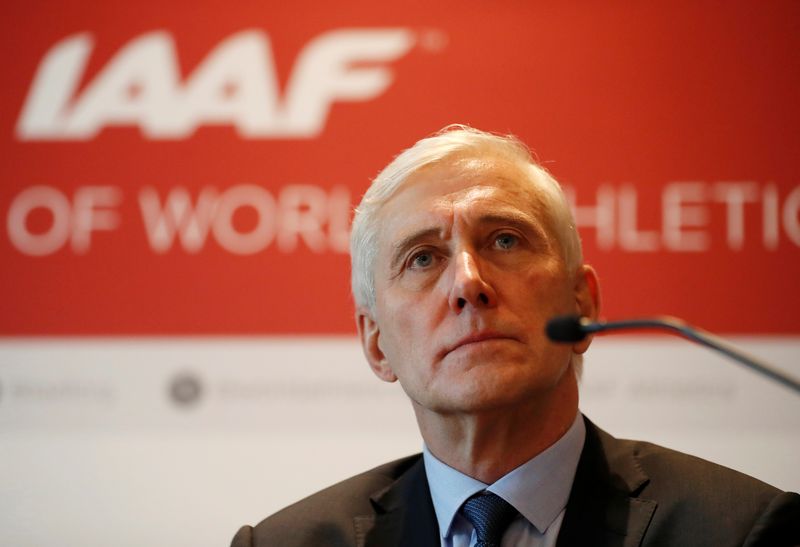[ad_1]

© Reuters. FILE PHOTO: Athletics – IAAF Council Press Conference – The Sea Club Conference Centre, Monaco – December 4, 2018 Rune Andersen, head of the IAAF taskforce on Russia during the press conference REUTERS/Eric Gaillard
By Mitch Phillips
LONDON (Reuters) – World Athletics has voted to end its eight-year ban of the Russian Athletics Federation (RusAF) but the country’s athletes, and those of Belarus, will remain excluded from international competition because of WA’s ongoing separate ban over the invasion of Ukraine, the governing body said on Thursday.
“Council approved the recommendation to exclude athletes and officials from Russia and Belarus from all our world athletics series events for foreseeable future due to the invasion and ongoing war in Ukraine,” WA President Sebastian Coe told a remote news conference.
The International Olympic Committee is exploring ways to enable sportsmen and women from those nations to compete as neutrals at the 2024 Paris Olympics but Coe said they would remain ineligible in athletics.
The Council also recommended that organisers of the Diamond League and other Tours take the same approach and exclude athletes and officials from both countries.
Russia reacted by condemning the “politicised restrictions” as unacceptable, but did hail the steps taken to achieve the end of the doping ban.
Coe had previously said Russia would need to “get out of Ukraine” before any reinstatement could be considered. He said on Thursday that a working group would be established to advise Council on the conditions that would need to be met for the ban to be lifted.
“The unprecedented sanctions imposed on Russia and Belarus by countries and industries all over the world appear to be the only peaceful way to disrupt and disable Russia’s current intentions and restore peace,” he said.
“The death and destruction we have seen in Ukraine over the past year, including the deaths of some 185 athletes, have only hardened my resolve on this matter.
“The integrity of our major international competitions has already been substantially damaged by the actions of the Russian and Belarusian governments, through the hardship inflicted on Ukrainian athletes and the destruction of Ukraine’s sports systems. Russian and Belarusian athletes, many of whom have military affiliations, should not be beneficiaries of these actions.”
Russian sports minister Oleg Matytsin, quoted by the RIA Novosti news agency, said: “We consider these politicised restrictions unacceptable, especially in the context of the recent speech by (IOC President) Thomas Bach against political influence in sport. The Olympic Games should remain neutral, and international federations should give all the best athletes the right to compete in their sport.”
STRONGLY RESTATED
With the war ban so strongly restated, the end of the doping suspension seemed almost irrelevant, having been around the top of Coe’s agenda from his first year of office in 2015.
RusAF was banned that year after the discovery of massive, state-sponsored doping and related cover-ups and a failure to meaningfully address the issue meant that the suspension remained in place.
However, Rune Andersen, head of WA’s Russia Task Force, reported in November that he was satisfied with the “new culture of good governance and zero tolerance for doping throughout the organisation”.
“An independent audit team confirms that RusAF has met all the detailed KPIs and other requirements set out in the reinstatement plan,” Andersen said on Thursday.
“RusAF has accepted a detailed set of post-reinstatement conditions designed to ensure there is no backsliding from the significant progress.”
Coe said there were 35 special conditions to be applied for the next three years with a review at the end of that period.
In recent years, dozens of Russian athletes had been allowed to compete as neutrals if they could show a doping-free background but they too remain unable to compete after the decision to maintain the “war ban”. The neutral athlete programme has now ended.
Matytsin said the lifting of the 2015 ban was a “clear vindication of the effectiveness of the system of combating doping in sports”.
“Russia has established a strict anti-doping system at all levels,” he said. “We continue to foster a culture of clean sports among athletes, coaches and specialists. I am sure that the decision of World Athletics will give a new impetus to the implementation of our goals to further develop athletics.”
[ad_2]
Source link
(This article is generated through the syndicated feed sources, Financetin doesn’t own any part of this article)
